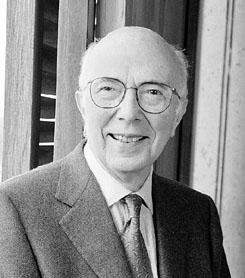Renato Dulbecco (Renato Dulbecco)

After the war Renato Dulbecco resumed his work at Levi’s laboratory, but soon he moved, together with Levi-Montalcini, to the U.S., where, at Indiana University, he worked with Salvador Luria on bacteriophages. In the summer of 1949 he moved to Caltech, joining Max Delbrück’s group (see Phage group). There he started his studies about animal oncoviruses, especially of polyoma family. In the late 1950s, he took Howard Temin as a student, with whom, and together with David Baltimore, he would later share the 1975 Nobel Prize in Physiology or Medicine for “their discoveries concerning the interaction between tumour viruses and the genetic material of the cell.” Temin and Baltimore arrived at the discovery of reverse transcriptase simultaneously and independently from each other; although Renato Dulbecco did not take direct part in either of their experiments, he had taught the two methods they used to make the discovery.
Throughout this time he also worked with Marguerite Vogt. In 1962, Renato Dulbecco moved to the Salk Institute and then in 1972 to The Imperial Cancer Research Fund (now named the Cancer Research UK London Research Institute). In 1986 he was among the scientists who launched the Human Genome Project. From 1993 to 1997 he moved back to Italy, where he was president of the Institute of Biomedical Technologies at C.N.R. (National Council of Research) in Milan. He also retained his position on the faculty of Salk Institute for Biological Studies. Dulbecco was actively involved in research into identification and characterization of mammary gland cancer stem cells until December 2011. His research using a stem cell model system suggested that a single malignant cell with stem cell properties may be sufficient to induce cancer in mice and can generate distinct populations of tumor-initiating cells also with cancer stem cell properties. Dulbecco’s examinations into the origin of mammary gland cancer stem cells in solid tumors was a continuation of his early investigations of cancer being a disease of acquired mutations. His interest in cancer stem cells was strongly influenced by evidence that in addition to genomic mutations, epigenetic modification of a cell may contribute to the development or progression of cancer.
Born
- February, 22, 1914
- Catanzaro, Italy
Died
- February, 19, 2012
- USA
- La Jolla, California



